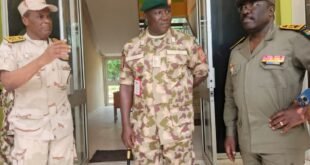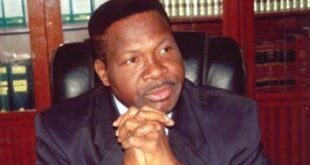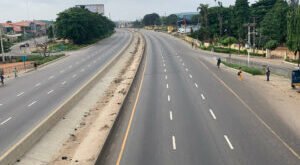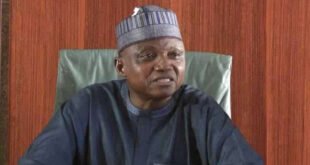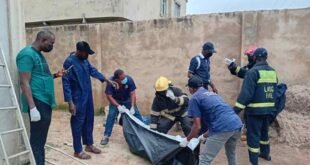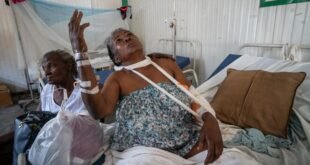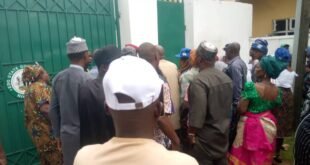A group of prominent Nigerian figures, “The Patriots” led by former Commonwealth Secretary-General, Emeka Anyaoku, last week called on President Bola Tinubu to convene a national constituent assembly to produce a new constitution for the country.
That same week, former President Olusegun Obasanjo called for the prosecution of public officials in the country for abusing their office.
This story and three others we tracked dominate public discourse in the country.
1. Anyaoku group again calls for new constitution

On August 9, a group of prominent Nigerians, “The Patriots” called on President Tinubu to convene a national constituent assembly to produce a new constitution for the country.
Anyaoku, who addressed reporters at State House at the end of a meeting with the president in Abuja, said the constituent assembly would consist of three members from each state elected by the people on a non-party basis.
He said: “We submitted several proposals to the President and urged the President to send the President’s Draft Law to the National Assembly, namely a bill containing two main things that must be implemented.
“One of them is the holding of the National Constituent Assembly which is mandated to produce a draft of a new constitution. We also propose that the National Constituent Assembly consists of people elected by the people in a non-party manner.”
Why this is important
The “Patriots” call highlights the desperation of concerned Nigerians to find any kind of solutions to the problems plaguing the country, with the current constitution seen as a hindrance to the country’s progress.
It is also a reflection of the state of disorder in Nigeria, a country whose economic woes are caused by inconsistent government policies and insecurity, especially in the North, and whose crumbling or obsolete infrastructure has become a common feature of its landscape.
2. Obasanjo on Nigerian leaders

Former President Olusegun Obasanjo on August 9 called for the prosecution of public officials in Nigeria.
The former president spoke as former chairman of the House of Representatives Downstream Petroleum Committee, Ugochukwu Chinyere, led six lawmakers who promoted the six-year single-term bill at the Olusegun Obasanjo Presidential Library in Abeokuta, Ogun State.
He said: “So, the beginning is ourselves, yes the system, yes we have to rethink our democracy, but the character of the people in government has to change. With all due respect, most of those in government today should be behind bars or on the gallows.”
Why this is important
The former president again touched on the twin problems of poor leadership and corruption that many see as the most significant obstacles to Nigeria’s development.
The statement highlights the culture of poor governance in Nigeria where corruption has become rampant and reached appalling levels.
This can also be said to be an invitation for Nigerians to take a fresh look at the leadership recruitment system that often produces self-interested individuals to occupy leadership positions to steer the country out of developmental backwardness.
3. Shehu Sani on violent protests in North Korea

Former member of parliament for Kaduna Central senatorial district in the National Assembly, Shehu Sani, claimed on August 7 that the violent incidents accompanying the #EndBadGovernance protests in the northern part of the country were aimed at toppling the government of President Bola Tinubu.
Sani, who stated this in a programme on Channels Television, Politics Today, said he gathered that a few days after the protests began, money and foreign flags were distributed among youths in the North to cause chaos and force a takeover of government.
READ ALSO:QuickRead: Ndume sacked as Senate leader. Four other stories we’re watching and why they matter
He said: “The day before the last protest, money was distributed to the youth, and Russian flags were also distributed. That shows that the whole point of this protest is not only about the government’s policies and programs.”
Why this is important
If Sani’s claims prove true, they reflect the life-or-death attitude that has become a hallmark of Nigeria’s political system, and is largely responsible for the emergence of the poor leadership that has dragged the country to its knees in recent years.
However, recent calls for military intervention in some quarters indicate growing dissatisfaction among the people with those they have elected to manage their affairs. However, the eighth thing is to wait for another electoral circle to express their dissatisfaction through the ballot box.
The rebellion can be said to be a timely reminder for the country’s leaders to tone down their excesses and put the interests of the people before personal interests or risk plunging the country into a constitutional crisis similar to what happened in several West and Central African countries last year.
4. IPOB demands a referendum

The Indigenous People of Biafra (IPOB) on August 5 criticized those behind the “IgboMustGo” campaign in the Southwest and demanded a referendum to determine the Igbo’s exit from Nigeria.
In a statement issued by its Director of Media and Publicity, Emma Powerful, the group alleged that influential figures in the Lagos state and federal governments were behind the “IgboMustGo” movement and warned Southerners to be wary of such acts in the South-West region.
The statement read: “Following the provocative and genocidal ‘IgboMustGo’ protest planned for August 20-30, 2024, by some anonymous Yoruba groups and individuals, the Indigenous People of Biafra (IPOB) reminds these anti-Igbo groups that Ndigbo are ready to leave Yoruba land and Nigeria through a referendum. We will not be intimidated by any group or individual to leave any state or region in Nigeria.”
Why this is important
The latest calls for the Igbo to leave the country again show how sharply divided Nigerians are along ethnic lines.
It is unfortunate that ethnicity and religion, instead of uniting Nigerians, have widened fault lines and divided the people along sectarian lines.
The mayhem wrought by criminals on Nigerians and the attitudes of politicians have turned Nigerians against each other and strengthened their resolve to sever the ties that hold them together.
Therefore, the onus is on the federal government to find a speedy solution to all the issues threatening the existence of corporations in Nigeria, especially the IPOB Biafran agitation to save the country from plunging further into anarchy.
5. Suspected herdsmen kill 30 in Benue community

Gunmen suspected to be bandits on August 8 killed at least 30 people in Ayati community, Ukum local government area, Benue State.
The state’s former gubernatorial candidate, Mr. Shima Ayati, confirmed the incident.
He said more than 30 bodies had been collected by Friday morning and search efforts were ongoing.
Ayati said, “We received information that there were some bandits who received money from herders and showed them land belonging to residents in two Council wards for grazing.
“And when they started grazing, there was a crisis between the herders and the farmers who cried out to the government.”
Why this is important
The latest attacks in Benue show how fragile the country’s security architecture has become after years of fighting criminals.
The challenge facing the government is to address these issues quickly to prevent the country from sliding into a failed state.
QuickRead: Anyaoku group renews call for new constitution. Four stories we track and why they matter first appeared on Latest Nigeria News | Top Stories from Ripples Nigeria.
 JamzNG Latest News, Gist, Entertainment in Nigeria
JamzNG Latest News, Gist, Entertainment in Nigeria
